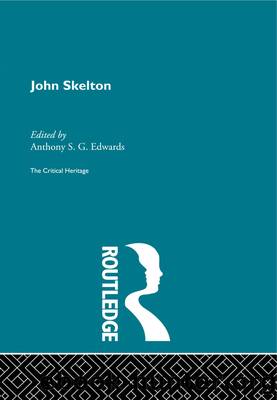John Skelton by Edwards Anthony;

Author:Edwards, Anthony;
Language: eng
Format: epub
ISBN: 179675
Publisher: Routledge
Nor was Skelton (with all respect for Mr. D'Israeli be it said) in any proper sense a Reformer: his opinions upon doctrine, as far as they appear, were those of his Church. The poem set forth with this adulatory dedication to Wolsey is a furious invective against the new teachers, who were springing up in the University of Cambdrige; and the ‘horryble heresy of these young heretykes, that stynke unbrent,’ is the denial of worship to the Virgin Mary.
[Quotes from ‘A Replycacion…’, lines 73–91.]
This was the difference between Skelton and Roy, (3) the other celebrated satirist of Wolsey: Roy was a Reformer, an assistant, not altogether it should seem an unexceptionable assistant, of Tyndale in his translation of the Bible; and it was the burning of these Bibles which excited Roy's violent indignation against the Cardinal.
Yet for this very reason Skelton's picture of the clergy, and of the great Cardinal, is the more curious, and, in some respects, more trustworthy, for, at least, it is not darkened by theological hatred; this Skelton reserved most piously for heretics. Much allowance must in justice be made for the personal character and feelings of Skelton; for the natural scurrility of the man, his envy in the one case, his disappointment in the other; but the libels of one age, fairly considered, become valuable historical evidence to posterity — often, as to manners and the opinions of the time, the best that can be attained. Skelton, in truth, was but the last echo of that voice, which had long been arraigning to the popular ear the inordinate wealth, the pride, the carelessness, the licence, the secular habits and feelings, and some of the more glaring superstitions of the clergy. Since the time of Wickliffe and the Lollards, no doubt this was mingled with much secret repugnance to some, at least, of the doctrines of the Church. But the dogmatic Reformers would have made their way much more slowly without these allies, who by no means shared their religious opinions, but confined themselves to lampooning the vices both of the secular and regular clergy. This politico-religious satire had long been at work, first in Latin, and afterwards in the rude vernacular tongues of Europe. Only occasionally, as we have said, and partially, but by no means generally connected with the Wickliffite or Hussite doctrines, it was a kind of spontaneous remonstrance against frauds and follies too palpable to the common sense of mankind; against the glaring disagreement of the lives of multitudes among both the monks and clergy, not only with the gospel, and the examples of worth and purity which had shone even on the worst ages of the Church, but even with the positive regulations of their own Canon-law. These songs were to the popular mind, what Erasmus was to the more learned world; and in the spirit at least, though neither in the tone nor taste of that scholar's attacks upon the monastic system, and the manners of the clergy, Skelton might
Download
This site does not store any files on its server. We only index and link to content provided by other sites. Please contact the content providers to delete copyright contents if any and email us, we'll remove relevant links or contents immediately.
The Fine Print (Dreamland Billionaires Book 1) by Lauren Asher(2546)
Fury of Magnus by Graham McNeill(2435)
The Last House on Needless Street by Catriona Ward(2380)
The Rose Code by Kate Quinn(2187)
A Little Life: A Novel by Hanya Yanagihara(2092)
Malibu Rising by Taylor Jenkins Reid(1902)
The God of the Woods by Liz Moore(1892)
Luster by Raven Leilani(1890)
Transcendent Kingdom by Yaa Gyasi(1843)
Moonflower Murders by Anthony Horowitz(1834)
The Lost Book of the White (The Eldest Curses) by Cassandra Clare & Wesley Chu(1678)
This Changes Everything by Unknown(1496)
The Midwife Murders by James Patterson & Richard Dilallo(1471)
The New Wilderness by Diane Cook(1434)
The Lying Life of Adults by Elena Ferrante(1424)
Wandering in Strange Lands by Morgan Jerkins(1406)
Written in the Stars by Alexandria Bellefleur(1390)
Ambition and Desire: The Dangerous Life of Josephine Bonaparte by Kate Williams(1379)
The Lying Life of Adults by Elena Ferrante;(1301)
